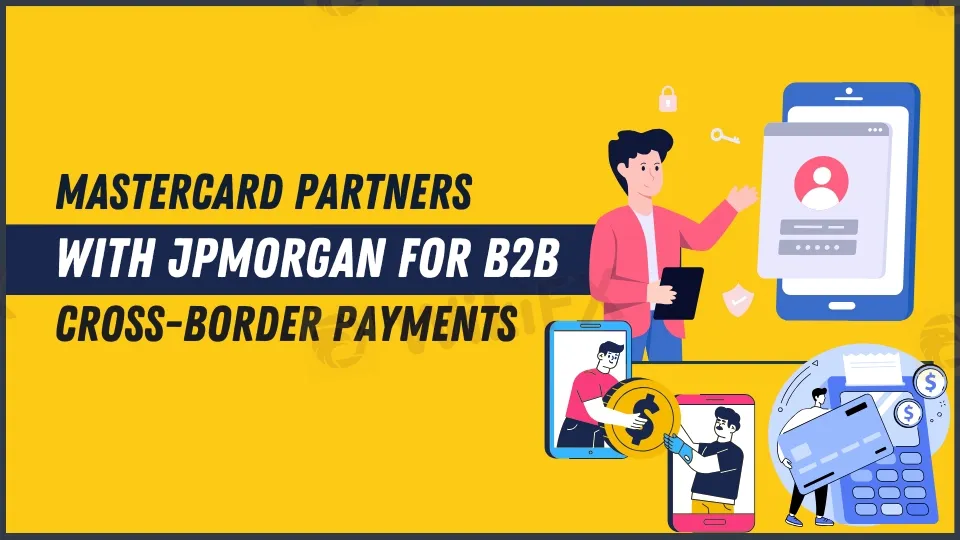简体中文
繁體中文
English
Pусский
日本語
ภาษาไทย
Tiếng Việt
Bahasa Indonesia
Español
हिन्दी
Filippiiniläinen
Français
Deutsch
Português
Türkçe
한국어
العربية
Mastercard Partners with JPMorgan for B2B Cross-Border Payments
Abstract:Mastercard and JPMorgan's Kinexys Digital Payments join forces to enhance B2B cross-border payments, promising faster settlements and greater transparency.

Mastercard has established a strategic relationship with JPMorgan's rebranded Kinexys Digital Payments, formerly known as JPM Coin, to improve B2B cross-border payments. This cooperation connects Mastercard's Multi-Token Network (MTN) to Kinexys' digital payment platform, improving the transfer of tokenized assets such as stablecoins and central bank digital currencies (CBDCs).
The primary goal of this collaboration is to speed up B2B transactions by increasing transparency, reducing settlement times, and removing time zone difficulties. The announcement, announced in a joint statement on Thursday, describes how these improvements would facilitate smoother cross-border transactions across global markets.
Mastercard's MTN, which debuted in mid-2023, was originally designed to evaluate the viability of tokenized bank deposits, stablecoins, and CBDCs in the payments ecosystem. MTN's integration with Kinexys will allow mutual clients to conduct B2B transactions via a single, unified API. This simplified approach intends to increase the speed and efficiency of international transactions, making global trade more accessible.

Raj Dhamodharan, EVP of Blockchain and Digital Assets at Mastercard, underlined the integration's potential, adding that it will enable speedier settlement capabilities for all players in the payment chain. This alliance comes at a time when JPMorgan is actively pushing the boundaries of digital asset use cases, as seen by the rebranding of its blockchain platform, Onyx, to Kinexys.
With this update, JPMorgan intends to integrate on-chain foreign exchange capabilities by the first quarter of 2025, cementing its position as a leader in automating near real-time, multi-currency clearing and settlement. This endeavor is part of a larger trend of tokenizing foreign exchange payments, which is being supported by programs such as the Monetary Authority of Singapore's Project Guardian, in which JPMorgan is heavily involved.
The collaboration between Mastercard and Kinexys represents a significant step forward in the evolution of cross-border payments, providing an innovative solution to long-standing issues in international commercial transactions. The companies are paving the path for a more efficient, secure, and transparent global payment infrastructure through the use of blockchain technology and tokenized assets.
Final Thoughts
As digital assets continue to disrupt the financial world, collaborations like the one between Mastercard and Kinexys are critical for fostering innovation. These companies are not only boosting the speed and efficiency of B2B cross-border payments; they are also laying the framework for the future of global commerce.

Disclaimer:
The views in this article only represent the author's personal views, and do not constitute investment advice on this platform. This platform does not guarantee the accuracy, completeness and timeliness of the information in the article, and will not be liable for any loss caused by the use of or reliance on the information in the article.
Read more

SEC Approves Hashdex and Franklin Crypto ETFs on Nasdaq
The SEC has approved crypto index ETFs by Hashdex and Franklin Templeton, including Bitcoin and Ethereum, marking a milestone in crypto asset investment.

North Korean Hackers Steal $1.3bn in Cryptocurrency in 2024
Over $2.2bn in cryptocurrency stolen in 2024, with North Korean hackers accounting for $1.3bn. Discover how cyber theft impacts the evolving crypto landscape.

ASIC Sues Binance Australia Derivatives for Misclassifying Retail Clients
ASIC accuses Binance Australia of misclassifying 500+ retail clients as wholesale, denying key consumer protections for crypto derivatives. Penalties and reforms are underway.

Revolut Leads UK Neobanks in the Digital Banking Revolution
Revolut dominates the UK neobanking scene with 15.6M downloads in 2024, surpassing traditional banks. Explore how innovation drives this fintech leader’s growth.
WikiFX Broker
Latest News
Geopolitical Events: What They Are & Their Impact?
Top 10 Trading Indicators Every Forex Trader Should Know
ASIC Sues Binance Australia Derivatives for Misclassifying Retail Clients
WikiFX Review: Is FxPro Reliable?
Malaysian-Thai Fraud Syndicate Dismantled, Millions in Losses Reported
Why Do You Feel Scared During Trade Execution?
WikiFX Review: Something You Need to Know About Markets4you
Revolut Leads UK Neobanks in the Digital Banking Revolution
Fusion Markets: Safe Choice or Scam to Avoid?
SEC Approves Hashdex and Franklin Crypto ETFs on Nasdaq
Currency Calculator


